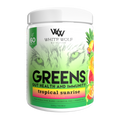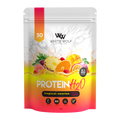Introduction
Millions of women worldwide suffer from the common hormonal condition known as Polycystic Ovarian Syndrome or PCOS. It’s linked to a range of symptoms, including irregular periods, difficulty conceiving, excessive hair growth, and, notably, digestive issues like bloating and fatigue. While PCOS itself is often difficult to manage, the role of diet in alleviating these symptoms can’t be overlooked. Let’s explore how your diet can contribute to PCOS-related bloating and fatigue, and provide actionable tips to help you manage the condition through healthier lifestyle choices.
How PCOS Affects Your Gut and Contributes to Bloating
PCOS can significantly affect your gut health as well as your ovaries. Women with PCOS often have an imbalance in their gut bacteria, which can impair nutrient absorption and disrupt proper digestion, leading to symptoms like bloating. Insulin resistance, another common issue in PCOS, can also contribute to digestive discomfort.
The Gut Bacteria and PCOS
Gut bacteria plays a key role in digestion and overall health. An imbalance in gut bacteria can worsen the symptoms of PCOS, such as bloating and digestive discomfort.
-
Improper digestion: Your body may struggle to properly digest the food due to an imbalance of gut bacteria.
- Inflammation: Gut bacteria imbalances can often lead to inflammation that can worsen the symptoms of PCOS, which include fatigue and bloating.
How Insulin Resistance Impacts Bloating
Insulin resistance or improper insulin processing is a common problem for women with PCOS. Which can lead to weight gain, water retention, and a bloated feeling.
-
Insulin resistance can cause a buildup of blood sugar and lead to fat storage, which may increase bloating.
-
High insulin levels may worsen gut health, contributing to bloating and discomfort.
How Diet Can Help Manage PCOS Symptoms
Managing PCOS is possible with lifestyle changes, especially when it comes to your diet. What you eat can play a significant role in reducing symptoms like bloating and fatigue.
Dietary Tips for Managing PCOS
Incorporating a nutrient rich diet is essential in managing PCOS. The following dietary changes that could help:
-
High-fiber foods: Eating foods like vegetables, legumes, and whole grains can promote healthy digestion and stabilize blood sugar levels.
-
Probiotics: Foods like fermented vegetables or yogurt helps aid with digestion, improve gut health, and reduce inflammation.
-
Lean proteins: Incorporate fish, tofu, and chicken to regulate blood sugar levels and improve overall health.
-
Hydration: Reducing bloating and constipation can be achieved by drinking lots of water.
-
Supplements: Consider taking supplements like our Greens Gut Health & Immunity to support digestion, but always consult a healthcare provider first.
Importance of Physical Activity and Sleep
Along with diet, exercise and sleep can significantly improve your PCOS symptoms.
-
Exercise: Getting regular exercise can help regulate menstrual cycles, increase insulin sensitivity, and reduce fatigue.
-
Sleep: Getting enough sleep helps balance your hormones, which is essential for managing PCOS symptoms.
Why Treating PCOS Is Important for Our Overall Health
While there is no cure for PCOS, managing the condition is crucial for overall health and well-being. By adjusting your diet, staying active, and getting proper rest, you can significantly reduce symptoms and improve your quality of life.
Managing PCOS requires a balanced approach, diet, exercise, and enough sleep. Understanding how your diet contributes to bloating, fatigue, and other PCOS symptoms is the first step toward feeling better. To better manage PCOS and take charge of your health, start incorporating the tips being discussed here.














